|
|
|
Sort Order |
|
|
|
Items / Page
|
|
|
|
|
|
|
| Srl | Item |
| 1 |
ID:
121781
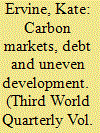

|
|
|
|
|
| Publication |
2013.
|
| Summary/Abstract |
The United Nations Clean Development Mechanism (cdm) has been envisaged as a powerful tool for reconciling the global South's environment and development problematic. By allowing Southern states to produce and sell carbon credits into the Kyoto Protocol's compliance market, many predicted a growing North-South transfer of carbon finance, technology and profit. Confronted by deep crisis in global carbon markets, however, the cdm, rather than spurring development, is furnishing the conditions for rising debt and insecurity since project costs must be financed upfront, with the expectation that future project revenue will subsequently fulfil these obligations. This paper analyses the dialectic entanglements between the cdm's ex post and market-dependent financing structure, the carbon market crisis and uneven development, based on the contention that cdm-related debt reveals the deeply unequal power relations that underpin contemporary approaches to climate change mitigation, whereby the North's ecological debt is displaced, both materially and financially, onto Southern actors.
|
|
|
|
|
|
|
|
|
|
|
|
|
|
|
|
| 2 |
ID:
121776
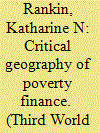

|
|
|
|
|
| Publication |
2013.
|
| Summary/Abstract |
This paper builds a critical geography of poverty finance with recourse to a relational comparison of the microfinance and subprime mortgage markets. It probes paradoxical claims about the nature of poverty, the poor, states and markets that have surfaced in the aftermath of the financial crisis. In doing so it aims to generate new understandings of neoliberal global finance with specific emphasis on 1) the social constitution of risk through racialised and gendered forms of difference; 2) the exercise of dispossession and imperialism by financial means; and 3) articulations of poverty finance with the social relations of debt in specific conjunctures. Each of these terrains of inquiry forms a subsection of the paper, following a preliminary section that poses the animating paradox in more detail. The paper concludes with some reflections on the conditions of possibility for democratising finance.
|
|
|
|
|
|
|
|
|
|
|
|
|
|
|
|
| 3 |
ID:
121784
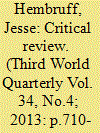

|
|
|
|
|
| Publication |
2013.
|
| Summary/Abstract |
In this article, I interrogate what is meant by 'the politics of sovereign debt', and examine how various authors, especially David Graeber, have addressed this question. More specifically, I seek to extend my contribution to the goals of the 'Repoliticizing Debt' workshop, which inspired this special issue, by proposing a theoretical framework for understanding the role of sovereign debt in mediating the contradictions of neoliberal capitalism, and by challenging dominant treatments of the sovereign debt crisis currently underway in Greece. I argue that the existing literature fails to help grasp the complexity of sovereign debt as a social relation, and that debt must be understood as what Marx refers to as 'fictitious capital', that is, capital backed not by a commodity transaction, but by a claim on future value. The management of confidence in the value of fictitious capital through the use of the 'golden noose' of debt is the key process to be understood in order to grasp the complexity of sovereign debt crises.
|
|
|
|
|
|
|
|
|
|
|
|
|
|
|
|
| 4 |
ID:
121779
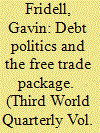

|
|
|
|
|
| Publication |
2013.
|
| Summary/Abstract |
While much has been written on how powerful institutions have used debt crises to foist free trade agreements on poorer states, this paper explores how the foisting of free trade agreements on poorer states has resulted in debt crises. Part one critiques the common-sense understanding of 'free trade' as a mere technical or policy issue, arguing that it is an intricate political, economic and ideological 'package' rooted in complex social, historical and cultural forces. Part two explores the role of debt in the free trade package by examining the impact of free trade agreements on the Caribbean over the past decade, during which time the region has experienced growing public and personal debt crises, further fuelled by an aid packages that included millions of dollars of concessional loans. It is argued that the contradictions of 'free trade' are mitigated through a 'debt for trade' paradigm, which Caribbean states are beginning to subvert through new preferential South-South partnerships.
|
|
|
|
|
|
|
|
|
|
|
|
|
|
|
|
| 5 |
ID:
121777


|
|
|
|
|
| Publication |
2013.
|
| Summary/Abstract |
The power, vulnerability and destructiveness of financial markets are out of control in South Africa, now among the most unequal, economically volatile and protest-intensive countries worldwide. While debt made itself felt in many sites, of interest in both criticising and promoting solutions is the 'scale jumping' required from South Africa's national insertion into the world financial system, entailing the Reserve Bank setting very high interest rates, in turn leading to unpayable levels of consumer debt, and at a time when microfinance is suddenly discredited as a development strategy. Macro- and micro-financial problems fused in the course of the Marikana Massacre of August 2012, reflecting the local and global powers of the Moody's rating agency and 'mashonisa' loan sharks. The over-indebted Marikana mineworkers, who led a strike which catalysed many wildcat strikes elsewhere, confronted the local crisis by displacing it into the national economy. This only heightened the contradictions that Moody's punished with its September 2012 credit-rating downgrade. Without a genuine 'debt relief' solution at both scales, society will continue to unravel, as financialisation reaches its limits within one of the world's most extreme cases of uneven and combined development.
|
|
|
|
|
|
|
|
|
|
|
|
|
|
|
|
| 6 |
ID:
121780
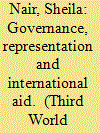

|
|
|
|
|
| Publication |
2013.
|
| Summary/Abstract |
The growth of the postwar 20th century international aid architecture has generated much debate over the successes and failures of aid, its changing forms and its challenges. This article uses this aid landscape to explore the representational or discursive power and authority of the aid donor over the aid recipient. It suggests that representations about what aid does, its modalities and dispensations reproduce a hegemonic discourse and that representational authority in diagnosing aid's problems and prescribing solutions resides generally on one side of the aid binary. It thus focuses on the hierarchical or asymmetric relations of power implied by such a binary, on the way development aid in particular has come to shape self-understandings of donors in relation to recipients, and on the discursive labour that enables such a construction. It also explores how the post-Washington consensus on poverty eradication has embedded neoliberal solutions to development. The reproduction of the hegemonic aid discourse is examined in reference to NGOs involved in the dispensing of aid in Southeast Asia by drawing on scholarly literature and field research in Southeast Asia and Washington DC.
|
|
|
|
|
|
|
|
|
|
|
|
|
|
|
|
| 7 |
ID:
121783
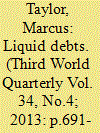

|
|
|
|
|
| Publication |
2013.
|
| Summary/Abstract |
This paper uses an approach grounded in political ecology and political economy to explain the social and ecological foundations of groundwater overexploitation and agrarian distress within semi-arid Andhra Pradesh It emphasises how relations of credit/debt have become intertwined with the tenuous social and ecological foundations of smallholder production to create a new dynamic of vulnerability across the agrarian environment. It thereby links cycles of groundwater depletion to the debt-driven survival strategies of India's small and marginal farmers within a context of dramatic changes in Indian agrarian social relations over the past three decades. In so doing, it critiques established perspectives that portray the trend towards acute groundwater overexploitation as stemming from inadequate regulation or information deficits among rural producers. Ultimately it argues that groundwater overexploitation represents a common tragedy of debt-driven livelihoods within an austere agrarian environment.
|
|
|
|
|
|
|
|
|
|
|
|
|
|
|
|
| 8 |
ID:
121785


|
|
|
| 9 |
ID:
121775
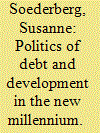

|
|
|
|
|
| Publication |
2013.
|
| Summary/Abstract |
This article serves as an introduction to this special issue of twq on 'Debt and Development in the New Millennium'. It highlights the gaps in our knowledge about debt that the following contributions seek to fill and why this is important, both analytically and politically. In doing so, it discusses two core objectives of the special issue: first, to examine the role(s) that debt plays in mediating the underlying tensions of neoliberal-led development and its emphasis on market-led growth and poverty reduction schemes; and, second, to interrupt, contest and deconstruct the dominant economic representations and meanings of debt. Although the contributions draw on different theoretical frames to explore different features of debt across a variety of social spaces, a core hypothesis running through each article is that that there are additional complex and paradoxical dimensions to debt beyond what is represented by its common-sense economic meaning as an amount of money borrowed, voluntarily, by one party from another. This introductory article concludes by providing the reader with an overview of each contribution comprising the special issue.
|
|
|
|
|
|
|
|
|
|
|
|
|
|
|
|
| 10 |
ID:
121778
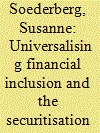

|
|
|
|
|
| Publication |
2013.
|
| Summary/Abstract |
In the wake of the 2008 financial crisis the G20 leaders have attempted to universalise financial inclusion as a key development strategy Financial inclusion, which has long been championed by official development institutions as a sound and effective market-based solution to combat poverty, is also now promoted by the G20, not only as a way out of the ongoing global recessionary environment but also as an important scheme to stabilise the world economy. To this end the G20 Financial Inclusion Experts Group forged the G20 Principles for Innovative Financial Inclusion in 2010 (the G20 Principles). Drawing on a historical materialist lens, I argue that the G20 Principles- which represent extensions of, as opposed to a departure from, the neoliberal development project-serve to legitimate, normalise, and consolidate the claims of powerful, transnational capital interests that benefit from finance-led capitalism. The primary way this is achieved is through obscuring and concealing the exploitative relations and speculative tendencies involved in financial inclusion strategies.
|
|
|
|
|
|
|
|
|
|
|
|
|
|
|
|
| 11 |
ID:
121782


|
|
|
|
|
| Publication |
2013.
|
| Summary/Abstract |
In the context of the world food crisis 'value-chain agriculture' is emerging as a new frontier of publicly subsidised corporate investment, incorporating smallholding farmers into commercial relations to redress apparent food shortages. This paper conceptualises value-chains as technologies of economic and ecological power, using cross-regional case studies to explore the impact of debt relations in extant value-chain relations. While the value-chain project envisioned by the development industry in partnership with the private sector is geared to 'feeding the world' the likely outcome is (differentiating) smallholders serving corporate markets at the expense of local food security. I argue that developmentalists seek to resolve the crisis through a 'spatio-temporal fix', enclosing smallholders in value-chain technologies financed through debt relations that appropriate value from smallholder communities. At the same time some farmers are seeking to avoid the debt trap by developing strategies to decommodify farming practices to preserve and revitalise their farms as creators of ecological values, rather than simply converters of economic value.
|
|
|
|
|
|
|
|
|
|
|
|
|
|
|
|
|
|
|
|
|